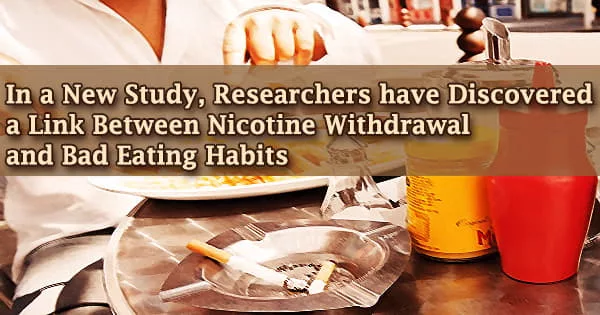Researchers from the University of Minnesota Medical School have discovered a link between nicotine withdrawal and bad eating habits. Their findings point to the opioid system, which controls addiction and appetite regulation in the brain, as a possible explanation for smokers’ predilection for high-calorie, high-energy foods during nicotine withdrawal. For people who have given up smoking, this might lead to weight gain, which can raise the chance of recurrence.
The nightshade family includes Nicotiana tabacum, the kind of nicotine found in tobacco plants. The nightshade family includes red peppers, eggplant, tomatoes, and potatoes. While nicotine does not cause cancer or cause substantial harm on its own, it is highly addictive and exposes people to the exceedingly destructive effects of tobacco addiction.
We looked at whether or not acute nicotine withdrawal increases the intake of junk food high in salt, fat, and sugar and how the stress-relieving receptors of the opioid system are involved.
Mustafa al’Absi
The principal investigator and senior author of the study recently published in the Journal of Drug and Alcohol Dependence is Mustafa al’Absi, PhD, a licensed psychologist, and professor in the Department of Family Medicine and Biobehavioral Health at the University of Minnesota Medical School, Duluth Campus.
“We looked at whether or not acute nicotine withdrawal increases the intake of junk food high in salt, fat, and sugar and how the stress-relieving receptors of the opioid system are involved,” al’Absi said. “By addressing these issues during the therapy process, patients will be able to quit smoking while also learning about their eating patterns and making healthier choices.”
When a person is exposed to nicotine, he or she feels a “kick.” Nicotine stimulates the adrenal glands, resulting in the production of adrenaline, which contributes to this. The adrenaline rush boosts the body. There is a rise in heart rate, respiratory activity, and blood pressure, as well as a rapid release of glucose. Nicotine also causes the pancreas to generate less insulin, resulting in a little rise in blood sugar or glucose levels.
During two laboratory sessions, the researchers looked at a sample of smoking and non-smoking adults ranging in age from 18 to 75. All were given either a placebo or 50 mg of naltrexone and were given a 24-hour withdrawal from nicotine products.
Participants were provided a tray of snack foods at the end of each session that ranged in energy density from high to low, as well as salty, sweet, and fat dimensions. The study found that:
Nicotine withdrawal smokers consumed more calories than non-smokers. After receiving naltrexone, participants were also less likely than placebo to choose high-fat foods. “The study’s findings may be related to the use of food, especially those high in calories, to cope with the negative affect and distress that characterizes the feelings people experience during smoking withdrawal,” al’Absi said. “Results from preclinical and clinical research support this and demonstrate that stress increases proclivity for high-fat and high-sugar foods.”
The opioid system may be a mechanism of withdrawal-induced calorie intake, as naltrexone regulated calorie intake to levels reported in nonsmokers. “This is rather a novel finding in the context of nicotine addiction and has lots of implications for the development of future treatment,” al’Absi said. The choice and consumption of food items were impacted by the participants’ smoking backgrounds.
Al’Absi and his colleagues are currently focused on the influence of hunger changes on weight gain after quitting smoking, as well as the extent to which these changes impede quitting and raise the likelihood of relapse. Future research will be crucial in determining the processes behind these alterations, which might be used to develop therapeutic approaches.
Nicotine causes an increase in heart rate, heart muscle oxygen consumption rate, and heart stroke volume in humans, mammals, and most other species. Pharmacologic effects are what they’re called.
“These findings extend earlier studies that indicate the impact of tobacco use on appetite and help identify the influence of an important biological link, the brain opioid system, on craving during nicotine withdrawal,” al’Absi said.
“The fear of weight gain is a major concern among smokers who think about quitting. The key to removing these barriers is to better understand the factors that increase the urge for high-calorie foods.”
Co-authors include Justin J. Anker, PhD Nakajima Motohiro, PhD, Sharon Allen, MD, PhD, of the University of Minnesota Medical School, and Susan Raatz PhD, MPH, RD, in the Department of Food Science and Nutrition at the University of Minnesota.
This research was funded, in part by grants R01DA016351 and R01DA027232 awarded to al’Absi and the Stress and Resilience Research Laboratory by the National Institute on Drug Abuse. The grant K01AA024805 was awarded to Anker by the National Institute on Alcohol Abuse and Alcoholism.





